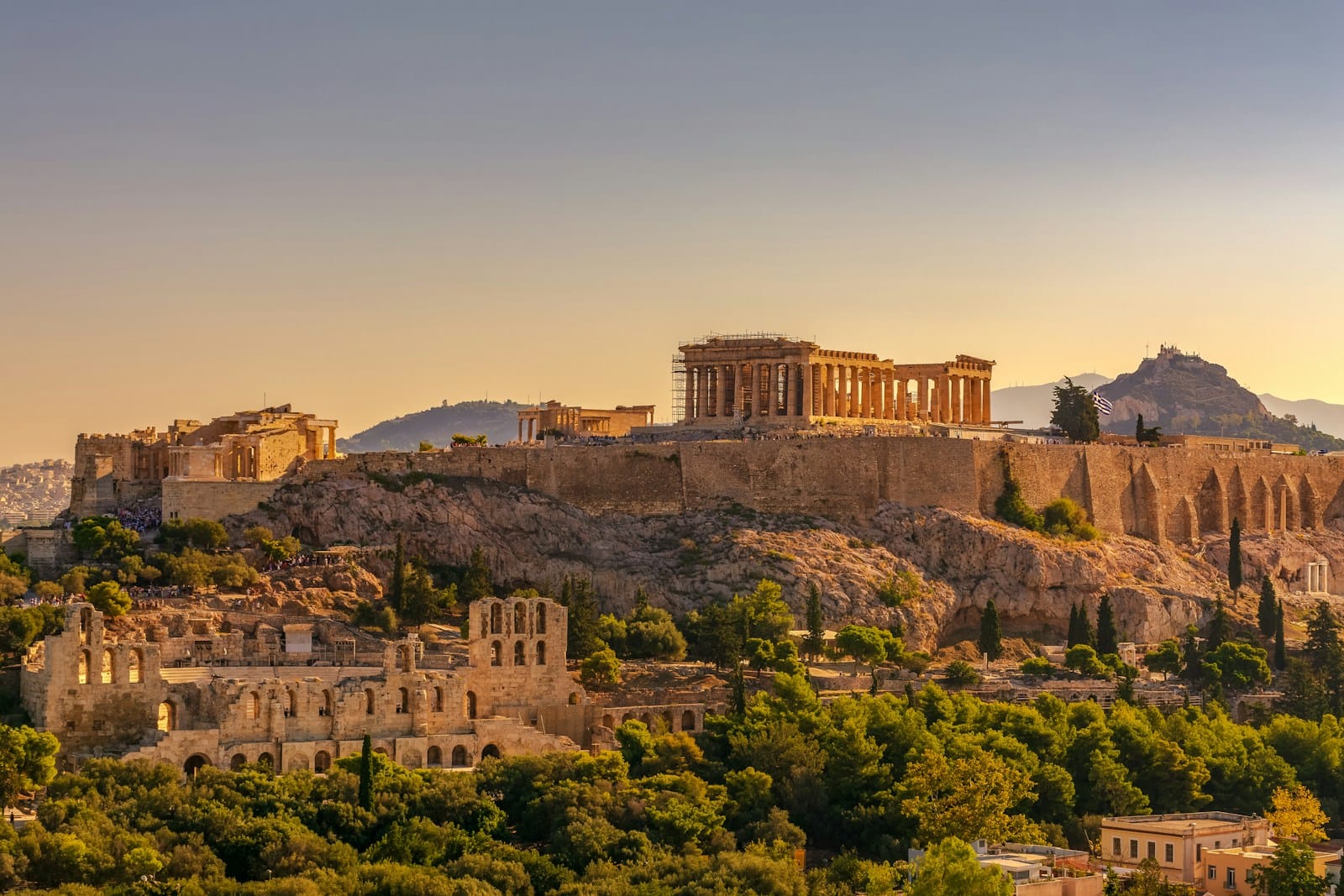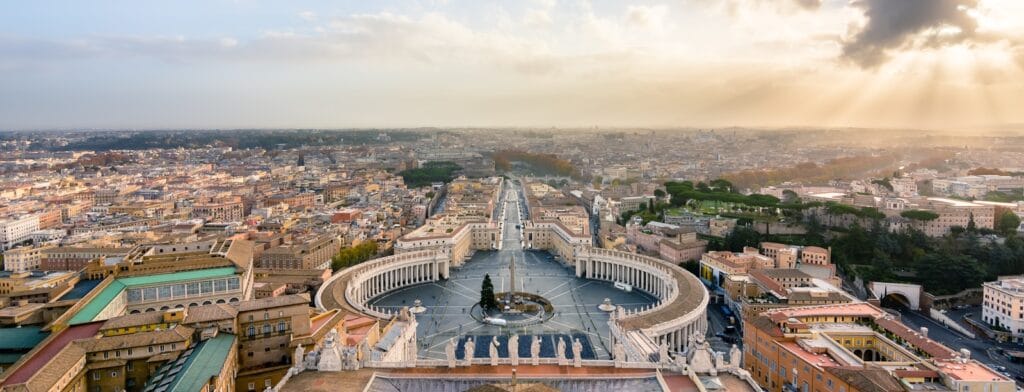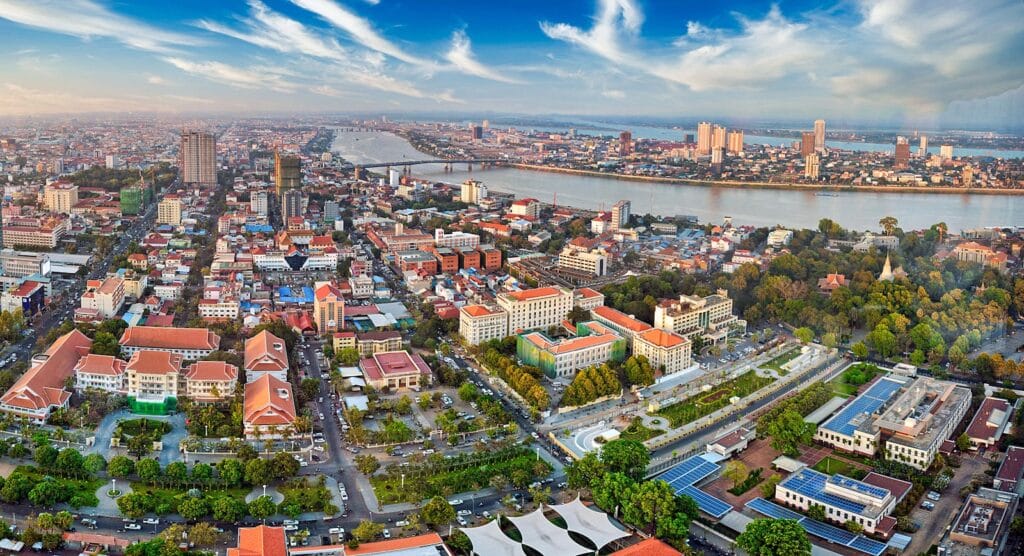Greece Travel Guide: Where Myth Meets Mediterranean Magic
Intro to Greece Travel Guide
From sun-bleached ruins and seaside tavernas to island-hopping bliss and cliffside sunsets, Greece seduces travelers with timeless beauty and unmatched diversity. Whether you’re tracing the footsteps of philosophers in Athens, sailing to secret Cycladic coves, or hiking Mt. Olympus, every journey in Greece is layered with wonder.
Greece is more than postcard perfection — it’s a cultural powerhouse, a nature escape, and a culinary celebration rolled into one unforgettable destination.
Start planning your journey with our complete Greece Tour Guide — uncover ancient cities, breathtaking islands, and magical travel experiences.
Continent: Europe (Southern Europe, Balkans)
Area: 131,957 km²
Population: ~10.3 million (2024)
Density: ~78 people/km²
Capital: Athens
Regions: Cyclades, Crete, Ionian Islands, Peloponnese, Central Macedonia, Thessaly, Dodecanese
Language: Greek (official); English widely spoken in tourist areas
Currency: Euro (EUR)
Time Zone: GMT+2 (EET); GMT+3 during daylight saving time (EEST)
Main Entry Airports: ATH (Athens), HER (Heraklion), SKG (Thessaloniki), RHO (Rhodes), CHQ (Chania), JMK (Mykonos), JTR (Santorini)
Climate: Mediterranean (hot, dry summers and mild, wet winters)
Known For: Ancient ruins, Aegean islands, blue-domed churches, mythology, olive oil, UNESCO heritage, traditional villages, beaches, vibrant festivals
Passport & Visa: Greece is part of the Schengen Area. Citizens of the US, Canada, UK, Australia, and most EU countries may enter visa-free for up to 90 days within a 180-day period. Passport must be valid for at least 3 months beyond departure. ETIAS authorization will be required starting in 2025. Greece Ministry of Foreign Affairs – Visa Information
No vaccinations are required for entry. Routine vaccines should be up to date. Healthcare is high quality in urban centers and islands like Crete and Rhodes. Pharmacies are abundant, and emergency services are well developed.
Travel health updates — get coverage here
Stay Informed with Official Updates: World Health Organization – International Travel and Health | Centers for Disease Control and Prevention – Global Travel Health
Greece is generally safe for travel. Minor theft and pickpocketing can occur in crowded areas like Athens metro stations and island ports. Wildfire risks exist in summer months.
Stay Informed with Official Updates: US Travel Advisory | UK Foreign Travel Advice
Public Holidays: National holidays include Greek Independence Day (March 25), Orthodox Easter (varies), Assumption Day (August 15), and Ohi Day (October 28). Expect closures during religious holidays and summer festivals.
Credit cards are widely accepted, though some rural areas prefer cash. ATMs are available across the country. Tipping is appreciated but not obligatory. Duty-free allowances include 1 liter of spirits and 200 cigarettes for non-EU arrivals.
Ferries connect mainland ports with the islands — popular lines include Blue Star Ferries and Seajets. Intercity buses (KTEL) cover most mainland regions. Driving is common on islands. Trains are limited outside northern Greece.
Cosmote, Vodafone, and WIND offer tourist SIM and eSIM options. 4G/5G coverage is strong in cities and many islands. Free Wi-Fi is available in hotels, restaurants, and public areas.
Respect for religious customs is important — wear modest clothing at monasteries and churches. Smoking is banned indoors but still common in practice. LGBTQ+ travelers are welcome in most tourist destinations like Athens and Mykonos.
Dial 112 for all emergencies. Tourist police speak English and are present in major destinations. For peace of mind, protect your trip with Compare Travel Insurance Options
The best time to visit is from April to June and September to October — ideal for mild temperatures and fewer crowds. Summer (July–August) is hot, with temperatures often exceeding 35°C in inland areas. Winters are mild in the south but colder in the north.
Weather Forecast
Greece by Region – Where to Go
Greece is divided into 13 administrative regions and hundreds of islands across several seas. Here’s a regional breakdown of where to go and why it matters.
Attica
- Athens: The capital is home to the Acropolis, world-class museums, buzzing neighborhoods like Plaka and Monastiraki, and a growing food scene.
- Cape Sounion: A perfect day trip to the Temple of Poseidon, perched dramatically over the Aegean Sea.
Central Macedonia
- Thessaloniki: Greece’s second city, famed for Byzantine churches, vibrant nightlife, and waterfront cafes.
- Mount Olympus: The mythical home of the gods and a top trekking destination.
Peloponnese
- Nafplio: A romantic seafront town with neoclassical charm and historic forts.
- Mycenae & Epidaurus: Ancient ruins and theaters dating back to classical Greece.
- Mani Peninsula: Wild coastlines and tower villages untouched by mass tourism.
Cyclades (Island Group)
- Santorini: Dramatic caldera views, luxury stays, and volcanic beaches.
- Mykonos: Famous for its cosmopolitan scene, whitewashed houses, and beach clubs.
- Paros & Naxos: Authentic villages, scenic beaches, and windsurfing coves.
Ionian Islands
- Corfu: Venetian architecture, lush hills, and olive groves.
- Kefalonia & Zakynthos: Emerald waters, sea caves, and postcard beaches like Navagio Bay.
Crete
- Heraklion: Gateway to the Minoan palace of Knossos.
- Chania & Rethymno: Ottoman-Venetian port towns with mountain backdrops.
- Samaria Gorge: A hiker’s paradise through Europe’s longest gorge.
Dodecanese Islands
- Rhodes: Medieval Old Town and crystal-clear beaches.
- Symi & Kos: Colorful harbors and ancient healing centers.
North Aegean
- Lesvos & Samos: Off-the-beaten-path islands with ouzo distilleries and pine-covered hills.
Thessaly
- Meteora: Monasteries perched atop giant rock columns — a surreal and spiritual destination.
Top Places to Visit in Greece
Grouped by theme, here are Greece’s must-see destinations:
Ancient & Cultural Capitals
- Athens: Walk through 3,000 years of history from the Acropolis to contemporary art galleries.
- Delphi: An ancient oracle site nestled in dramatic mountain scenery.
- Thessaloniki: A cultural melting pot with Roman, Ottoman, and Byzantine layers.
Islands & Seaside Escapes
- Santorini: Sunset views, white-washed villages, and luxury cliffside stays.
- Mykonos: Beach parties, boutique hotels, and Cycladic style.
- Zakynthos: Home to the iconic Navagio (Shipwreck) Beach.
Nature & Adventure Spots
- Meteora: Rock pillars crowned with cliff-hanging monasteries.
- Crete: Trek through Samaria Gorge, explore hidden mountain villages, and relax on pink-sand Elafonissi Beach.
- Mount Olympus: Greece’s highest peak and a haven for hikers and mythology lovers.
How to Choose Where to Go in Greece
To plan the ideal Greece itinerary:
- For History & Culture: Athens + Delphi + Peloponnese (Mycenae, Nafplio, Epidaurus)
- For Island Escapes: Santorini + Naxos or Paros (Cyclades), or Corfu + Zakynthos (Ionian)
- For Adventure: Samaria Gorge, Mt. Olympus, and Meteora combine nature with spiritual energy
- For Romance: Choose Santorini, Symi, or Hydra for cliff views and quiet strolls
- For Local Flavor: Visit Crete, Naxos, or the Peloponnese for traditional life and regional cuisine
Efficient combinations:
- Athens → Santorini → Naxos
- Athens → Peloponnese → Meteora
- Thessaloniki → Mt. Olympus → Corfu
How to Get Around Greece
Travel in Greece requires combining land and sea:
- Domestic Flights: Best for reaching distant islands (e.g., Crete, Rhodes, Corfu) — airlines include Aegean and Sky Express.
- Ferries: Frequent services from Athens’ ports (Piraeus, Rafina) to Cyclades, Dodecanese, and Crete.
- Buses (KTEL): Intercity coaches cover most of mainland Greece affordably.
- Trains: Limited network; routes like Athens–Thessaloniki are scenic and reliable.
- Car Rentals: Ideal for Peloponnese, Crete, and northern Greece.
- Scooters & ATVs: Popular for island exploration.
- Taxis & Apps: Uber exists in Athens (only for taxis); Beat and FreeNow work in major cities.
Travel Budget & Costs in Greece
Greece is affordable compared to Western Europe:
- Budget: €40–60/day — hostels, gyros, buses
- Mid-Range: €80–150/day — boutique hotels, ferries, tavernas
- Luxury: €200–500+/day — cliffside suites, private yachts, guided tours
Sample prices:
- Ferry Athens–Santorini: €30–70
- Acropolis ticket: €20 (combo ticket includes 5+ sites)
- Street food (gyros, souvlaki): €3–5
- Dinner at a taverna: €15–25 per person
Tip: Book summer ferries and island stays in advance — July/August sells out fast.
Best Time to Visit Greece
Spring (April–June)
- Mild weather, blooming landscapes, fewer tourists
- Ideal for outdoor ruins and hiking
Summer (July–August)
- Peak season — lively, hot, and crowded
- Best for beach life and island parties
Autumn (September–October)
- Warm seas, harvest festivals, and golden sunsets
- Perfect for wine regions, hiking, and photography
Winter (November–March)
- Best for city and cultural travel (Athens, Thessaloniki)
- Some islands “close” for the season
Festivals to Catch:
- Greek Easter: The biggest celebration with fireworks and food
- Athens & Epidaurus Festival (Summer): Outdoor theatre and music
- Carnival (Apokries): Costumes and parades in Patras and Crete
Must-See Experiences in Greece
Here are the most unforgettable things to do in Greece, from temples to tavernas:
- Climb the Acropolis at sunrise and gaze over Athens.
- Sail between Cycladic islands on a multi-day cruise.
- Swim in Zakynthos’ Blue Caves or on Navagio Beach.
- Trek the Samaria Gorge through dramatic rock cliffs in Crete.
- Wander the medieval streets of Rhodes Old Town.
- Watch the sunset in Oia, Santorini — early arrival is key.
- Dine at a beach taverna in Naxos, feet in the sand, ouzo in hand.
- Visit Meteora’s hanging monasteries at golden hour.
- Enjoy a Greek cooking class using olive oil, fresh herbs, and filo.
- Explore the ruins of Delphi, once considered the navel of the world.
Book immersive Greece tours and experience unforgettable things to do in Greece — from sacred temple rituals and highland treks to floating markets and lakeside food adventures.
Best Travel Itineraries in Greece
7-Day Highlights
- Athens (2 days) → Santorini (2) → Naxos or Paros (3)
10-Day Culture + Nature
- Athens → Delphi → Meteora → Thessaloniki → Mt. Olympus
2-Week Island-Hopping
- Athens → Mykonos → Naxos → Santorini → Crete
Off-the-Beaten-Path
- Athens → Peloponnese (Nafplio, Mani) → Monemvasia → Hydra
Customize with archaeology, beaches, or mountains depending on your passion.
Local Cuisine & Culinary Experiences
Greek cuisine is vibrant, healthy, and filled with flavor — made for sharing.
Must-Try Dishes:
- Moussaka: Baked eggplant with minced meat and creamy béchamel
- Souvlaki & Gyros: Grilled meats wrapped in pita
- Horiatiki (Greek Salad): Tomatoes, cucumber, feta, olive oil, oregano
- Dolmades: Grape leaves stuffed with rice and herbs
- Kleftiko: Slow-cooked lamb with lemon and herbs
- Baklava: Sweet pastry with nuts and honey syrup
Culinary Experiences:
- Wine tasting in Nemea, Santorini, or Crete
- Olive oil farms with tastings and tours
- Cooking classes in Athens, Naxos, or the Mani
- Taverna hopping along island coasts or Athens’ Psiri district
Travel Safety & Cultural Etiquette in Greece
Safety:
- Greece is very safe for tourists.
- Watch for pickpockets in busy areas like the Athens Metro or ferry ports.
- Always wear a helmet on scooters/ATVs — and check insurance.
Etiquette:
- Dress modestly for monasteries and churches.
- Tipping isn’t required but rounding up is appreciated.
- Greeks eat late — dinner usually starts around 8–9 PM.
- Don’t flush toilet paper — bins are used in most places.
Where to Go Next – Pair Greece with These Destinations
- Italy: A classic Mediterranean combo with direct flights and ferry routes
- Turkey: Easy ferry crossings from islands like Rhodes and Kos
- Albania: An emerging beach and mountain destination across the Ionian
- Cyprus: A Mediterranean cultural blend of Greek and Middle Eastern flavors
Explore more nearby countries:
Final Planning Checklist for Greece
• Plan around your island-hopping or mainland circuit
• Book ferries, car rentals, and high-season hotels early
• Download offline maps and ferry timetables
• Bring light layers, sunscreen, and comfortable walking shoes
• Pack a travel plug (Type C/F) for European sockets
• Confirm visa rules (Schengen) and travel insurance coverage
• Carry some cash for taxis, tavernas, and rural areas
• Respect monastery dress codes (no shorts or sleeveless tops)
• Learn basic Greek greetings — locals appreciate it
• Always arrive early for ferries — boarding can be hectic
Explore Greece with confidence using our trusted tips, local insights, and region-by-region planning tools.
For more expert travel tips, practical strategies, and trusted tools — visit our Homepage and get inspired for your next trip.









